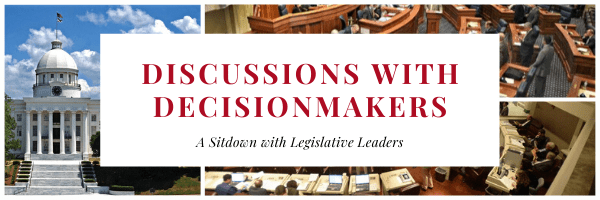
Justice William B. Sellers was appointed by Governor Kay Ivey in May 2017 to fill a vacancy on the Supreme Court of Alabama.
Justice Sellers received a Bachelor of Arts degree from Hillsdale College in 1985, a Juris Doctorate from the University of Alabama in 1988, and a Masters of Laws in Taxation from New York University in 1989. Justice Sellers practiced law in Montgomery for 28 years. He maintained a general business practice with emphasis on taxation, business organizations and finance. A major part of Justice Sellers’s practice involved tax litigation.
Justice Sellers and his wife, Lee, have been married for 35 years. They are members of Trinity Presbyterian Church and have three adult children.
Can you tell us a bit about your early life and upbringing? Where were you born and raised?
I was born in Montgomery and still live in the same neighborhood; Thirty-five years ago, I married the girl down the street. My father was an investment banker and, before she had 4 children, my mother was a history professor. My parents were a devoted couple, very active in the civic life of our community and provided our family with a wonderful nurturing environment.
What motivated you to pursue a career in law and ultimately run for office?
I was the last of 4 children and when my sister left to go off to college, I was virtually an only child, so I spent a lot of time with my parents and I saw in particular from my father’s standpoint how complicated the law was and how difficult it was for businesses to prosper in that environment. I observed how his lawyers solved regulatory and other legal problems and I thought a career in law would be challenging for me.
In 2017 after Gov. Ivey became governor there was an opening on the court and she appointed me. I was elected in 2018 without any opposition.
Where did you go to law school and what did you do before serving on the bench?
I received by undergraduate degree from Hillsdale College with the BA in History and Political Economy. I received a JD from the University of Alabama and then I went to NYU where I received an LL.M in taxation.
Could you share some highlights from your legal career before becoming a judge? What type of law did you practice?
For 28 years I practiced tax law in Montgomery. While I primarily had an office practice, I also handled tax controversies and successfully litigated cases against the Alabama Department of Revenue and Internal Revenue Service.
Could you walk us through your approach to analyzing a complex legal case?
When cases are assigned to me, I review the order or motion that is being appealed so I can understand what the real issues are that the parties are disputing. I then review the briefs to make sure I understand the material facts and then I look at the law to understand the basis for the lower court’s decision. Based on my review of the law, I decide whether we should affirm the trial court’s decision or reverse it. Then, I write an opinion explaining my reasoning for the action I think the court should take with the appeal.
In medicine, physicians go through residency training after medical school and often cite mentors that impacted and made him or her the doctor they are today. Have there been individuals who’ve had a significant impact on your legal career or your life in general?
Absolutely! I had great professors in college. Dr. Jim Juroe taught me how to write with precision, Dr. John Willson made me love the founding of America, Dr. Rodler Morris engaged my thinking about the history of science and Dr. Tom Burke challenged me to think critically about the Protestant Reformation. In law school, Don Turlington gave me an appreciation of the complexities of partnership taxation and Richard Pomp opened the world of state and local taxation to me.
What is the most rewarding aspect of serving on the Alabama Supreme Court for you personally?
By the time cases get to us, they are usually complicated and have the potential to be very significant. To decide these important cases and know that our decisions have a wide impact is personally fulfilling.
What is the one thing you would like to say to physicians in Alabama?
Thank you for what you do. I hope you will view Alabama’s judicial system favorably and find that our system provides consistency and certainty so that professionals can conduct business in Alabama knowing that the court system provides a fair and stable environment to efficiently resolve disputes.